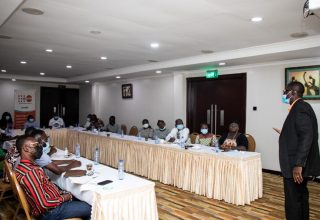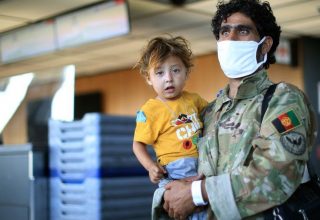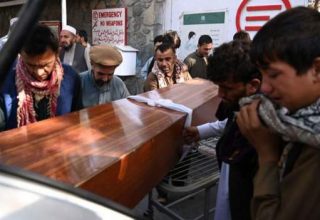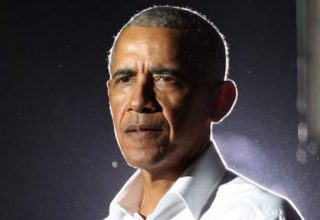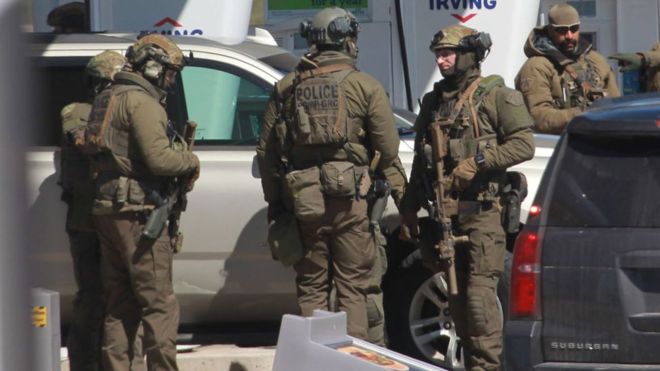
A gunman disguised as a policeman killed at least 18 people, including a female Royal Canadian Mounted Police (RCMP) officer, in the worst mass shooting in Canada’s modern history.
The 12-hour rampage started late on Saturday and ended with a car chase.
Police said the suspect shot people at different locations in Nova Scotia, many of them randomly. He was killed in a confrontation with police.
He was reported to have been driving what looked like a police car.
Canadian Prime Minister Justin Trudeau described the attack as “a tragedy”.
“Violence of any kind has no place in Canada. We stand with you and we grieve with you,” he said, addressing the nation on Monday.
Nova Scotia Premier Stephen McNeil told reporters this was “one of the most senseless acts of violence in our province’s history”.
The RCMP said on Monday that they believe there may be more victim within the remains of homes torched as part of the weekend’s attacks.
Mr Trudeau said that his government was “on the verge” of introducing bans to assault style weapons before parliament was dissolved amid the coronavirus outbreak.
“We have every intention of moving forward”, once the outbreak is curbed, he said.
What do we know about what happened?
At about 23:32 local time on Saturday (02:32 GMT on Sunday), the RCMP said officers were responding to a “firearms complaint” at a home in the small town of Portapique and advised residents to lock themselves indoors.
The officers found “several casualties” inside and outside the home, but did not find the suspect.

A neighbour told CBC News that he saw three properties were also on fire in the area at the time.
At 08:54 on Sunday, the RCMP said there was an “active shooter investigation” and that there were several victims. It identified the suspect as 51-year-old Gabriel Wortman, who owned three properties in Portapique.
RCMP officers continued pursuing Wortman for hours, following a series of crime scenes that police said were “scattered across the province” and which they are still working to piece together.
Wortman was later seen in the Glenholme and Debert areas, east of Portapique, driving what the appeared to be an RCMP vehicle and possibly wearing an RCMP uniform.
“There’s one difference between his car and our Royal Canadian Mounted Police vehicles: the car # [registration plate]. The suspect’s car is 28B11, behind rear passenger window. If you see 28B11, call 911 immediately,” the force tweeted.

Wortman then changed cars and was seen driving southbound along on Highway 102 from the Brookfield area in a silver Chevrolet Tracker, according to the RCMP.
At 11:40, the RCMP said that Mr Wortman had been taken into custody.
It later emerged that he was killed after being intercepted by officers at a petrol station in Enfield, about 92km south of Portapique. Witnesses reported seeing a body lying on the ground.
Sense of the ‘incomprehensible’
By Jessica Murphy, BBC News, Toronto
You could hear it in the voices of the RCMP officers on Sunday as they spoke to the media – a weary disbelief, a sense of the “incomprehensible”.
The update came after a long 12-hour manhunt – and at the beginning of what will be a complex investigation over multiple crime scenes.
Only now is the full scope of the tragedy beginning to be revealed.
Like many countries, Canada has experienced mass killings before.
Canadians would usually gather to commemorate the victims at vigils and funerals, seeking solace in community.
That this happened during the coronavirus pandemic means Canadians will not be able to come together in the same way to heal.
What do we know about the victims?

RCMP Constable Heidi Stevenson, who had served in the force for 23 years, was among those killed.
“Heidi answered the call of duty and lost her life while protecting those she served,” Nova Scotia RCMP Commanding Officer, Assistant Commissioner Lee Bergerman said in a Facebook post.
“Two children have lost their mother and a husband his wife. Parents lost their daughter and countless others lost an incredible friend and colleague,” Commissioner Bergerman said.
Lisa McCully, a teacher at Debert Elementary School, was also killed in the attack, according to a statement from the Nova Scotia Teachers Union.
It said union members – along with colleagues, students, family and friends – were heartbroken, adding that Ms McCully was known “not only as a passionate teacher but as a shining love in their lives”.
Other victims listed by the Globe and Mail newspaper included Jamie Blair and Greg Blair; and Heather O’Brien, a nurse from Truro, east of Portapique.
A male RCMP officer suffered non-life threatening injuries.
Authorities are still trying to establish the final death toll.
After learning about the shooting, Mr Trudeau said his “first thought” was for Nova Scotians, “such a connected group”.
“I know the vast majority of Nova Scotians will have a direct link with one or more of the victims,” he said.
What do we know about the gunman?

Neighbours say Wortman owned a successful denture clinic in Dartmouth, and had a strong interest in RCMP and RCMP memorabilia, the Globe reports.
Chief Superintendent Chris Leather said he was not aware that Wortman had a history of violence, or extremist political views, and that there did not appear to be anything linking the victims to each other.
RCMP Commissioner Brenda Lucki said she believed the gunman had an initial “motivation” that “turned to randomness”, according to CBC News.
The police provided few details about how the suspected gunman died.
At a press conference on Monday, Mr Trudeau celebrated the first responders at the scene in Nova Scotia but did not name Wortman.
“Do not give him the infamy” he so wanted, the prime minister said.
Are mass shootings common in Canada?
Mass shootings are relatively rare in Canada where gun ownership laws are stricter than in the neighbouring United States.
Last year, two fugitive teenagers confessed to killing three people, including an Australian-US couple on holiday, in northern British Columbia.
In 2017, university student Alexandre Bissonnette shot dead six worshippers at a Quebec City mosque.
The Royal Canadian Mounted Police have been targeted in a number of shootings, including in an attack that left three officers dead in Moncton, New Brunswick, in 2014.
The 1989 Polytechnique massacre in Montreal left 14 women dead. A gunman sent all the men out of a classroom at an engineering college before opening fire on the women in what was – until this weekend – the country’s deadliest shooting.
Source: BBC




